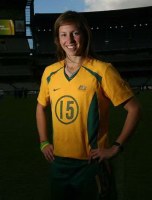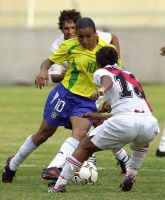The Ultimate New Zealand Soccer Website | home
Project Russia Results | Argentina Tour | Project Russia Match Reports | 2005 U-19 Stars | Behind The Scenes | Scenes From Samoa | Apia Team Photos | Player Profiles | Finals Preview | Finals Opponents | Finals Squad Pen Pix | The Final Review | Line-Ups
Finals Opponents
The Opposition
by Jeremy Ruane
New Zealand has been drawn in the strongest of the four groups contesting the finals. Make no mistake, progressing to the last eight will be an achievement in itself for John Herdman's charges, but that is the target this young squad - average age 16.6 years - has set themselves.
The key match, for this writer, is their opening encounter, the first-ever trans-tasman derby in a World Cup Finals. Indeed, it's not out of the question to label it their World Cup Final!
If Kirsty Yallop (left) and company can come out of that match with a favourable outcome, the wave of confidence on which they'll be riding could well see them realise their ambitions and take them to the quarter-finals. There is plenty of self-belief in this squad, but they certainly face some strong challenges …
Australia - Petrovsky Stadium, St. Petersburg, 12am August 18 (NZ time)
After topping their group, the Young Matildas defeated Japan in the third place play-off at the Malaysian qualifying tournament to advance to Russia, marking Australia's first success as members of the Asian Football Confederation.
 Coached by Alistair Edwards, the squad features a host of players who have already made numerous appearances for the Matildas, including captain Sally Shipard (left), Collette McCallum, Leah Blayney, Kim Carroll, Kylie Ledbrook, Claire Polkinghorne, Sasha McDonnell and goalkeeper Lydia Williams. Coached by Alistair Edwards, the squad features a host of players who have already made numerous appearances for the Matildas, including captain Sally Shipard (left), Collette McCallum, Leah Blayney, Kim Carroll, Kylie Ledbrook, Claire Polkinghorne, Sasha McDonnell and goalkeeper Lydia Williams.New Zealand have improved significantly since losing 3-1 and 4-0 to the Young Matildas in Canberra in February, which was key preparation for the latter's Asian qualifying campaign. Since then, Australia has only once kicked a ball in anger at this age level, a 3-0 loss to Canada in a pre-tournament friendly in St. Petersburg.
Russia - Petrovsky Stadium, St. Petersburg, 3am August 21 (NZ time)
Had already qualified as host nation when contesting the 2005 UEFA U-19 Women's Championships, but strengthened their cause considerably by claiming the crown. Half of that squad have just been competing in the 2006 version of the competition, in which the Russians were beaten semi-finalists.
 Coach Valentin Grishin has moulded a quality combination in which the firepower of strikers Elena Danilova (right) - the leading scorer in both the UEFA 2005 and 2006 competitions - and Elena Terekhova is highly prominent. They have played together as a front-running combination since they were aged ten. Coach Valentin Grishin has moulded a quality combination in which the firepower of strikers Elena Danilova (right) - the leading scorer in both the UEFA 2005 and 2006 competitions - and Elena Terekhova is highly prominent. They have played together as a front-running combination since they were aged ten.Winger Elena Morozova, goalkeeper Elvira Todua and midfield trio Oxana Titova, Olga Petrova and
|
Victoria Afanasova are other key members of a squad which, given their host nation status, will face pressure aplenty to perform, something which could prove an unwelcome burden to them.
Brazil - Podmoskovie Stadium, Moscow, 12am August 24 (NZ time)
Known as the Canarinhas or the Auriverdes, Brazil bulldozed through their qualifying campaign in Chile in January, scoring thirty-seven goals in their seven matches, including a 1-0 defeat of Argentina to advance to Russia as CONMEBOL's leading qualifier.
Coach Luis Antonio Ferreira has been in charge of Brazil's national women's youth teams since January 2002, during which time the South American superpower has improved exponentially in women's football, to such an extent that this squad harbours high hopes of becoming Brazil's first world champions in the women's game.
 One player in particular on whom hopes rest is midfield maestro Marta (left), the same Marta who has been a FIFA World Player of the Year award finalist for the past two years, and who was among the leading scorers at the 2003 FIFA Women's World Cup Finals. One player in particular on whom hopes rest is midfield maestro Marta (left), the same Marta who has been a FIFA World Player of the Year award finalist for the past two years, and who was among the leading scorers at the 2003 FIFA Women's World Cup Finals. She will be ably assisted by, among others, Renata Costa, Adriane, Erika and Josiane, as Brazil bid to build on preparations which included hosting a tri-series tournament in April, where they finished bottom of the table behind fellow finalists Canada and the USA, who won the Ricardo Teixeira Cup.
Beyond the group phase
Should the New Zealand squad realise their lofty ambition of progressing to the quarter-finals - and it won't be for the want of trying if they don't, have no fear of that! - they will find themselves up against one of the top two place-getters in Group B, most likely to be China and Canada.
After being beaten in extra-time by the USA in New Jersey, the Asian champions downed Canada 2-0 and 1-0 in recent pre-tournament friendlies. The Canadians twice defeated another team in this group, Finland, 2-0 in Scandinavia earlier this year, and most recently drew 2-2 with another finalist, Mexico.
Nigeria were one of the last teams to qualify for the finals, doing so as recently as May. They encountered just two opponents en route to Russia, and the Falconettes duly swept aside both Kenya and Liberia to book their tickets. They will arrive in Russia via a two-week acclimatisation - cum - training camp in Ukraine, and a three-week training camp in Lagos.
In Group C, anticipate a strong showing from Germany, while it would be prudent not to underestimate North Korea in a group which could see Switzerland and Mexico struggle.
Group D looks likely to be dominated by the USA and France, a country which has made significant progress in the women's game in recent years. DR Congo (formerly Zaire) upset South Africa in qualifying for Russia, but are likely to find the going far tougher here, as are Argentina.
|